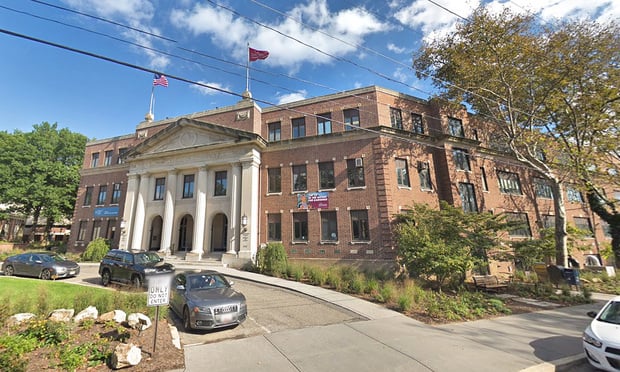3rd Circ. Reinstates Expelled Student's Suit Over USciences' Title IX Investigation
A federal appeals court has reinstated a lawsuit filed by a former University of the Sciences student who claimed his expulsion was the result of a biased university investigation into his sexual encounters with two women.
June 08, 2020 at 04:38 PM
4 minute read
 University of the Sciences in Philadelphia. Photo: Google
University of the Sciences in Philadelphia. Photo: Google
A federal appeals court has reinstated a lawsuit filed by a former University of the Sciences student who claimed his expulsion was the result of a biased university investigation into his sexual encounters with two women.
The U.S. Court of Appeals for the Third Circuit ruled in favor of the John Doe plaintiff, reversing a July 2019 ruling from U.S. District Chief Judge Juan R. Sanchez of the Eastern District of Pennsylvania granting the University of the Sciences' motion to dismiss.
Third Circuit Judge David Porter wrote in the court's precedential May 29 opinion that Doe's case was wrongly dismissed because the plaintiff made plausible allegations supporting his claims that the school was improperly motivated by sex when it investigated and enforced its sexual misconduct policy against him in addition to breaching its contract with him by failing to give him fair treatment laid out in the policy.
Reached Monday, Doe's attorney, Riley Ross III, said, "My client and his entire legal team are grateful that the Third Circuit has allowed us to continue the fight to correct the mistreatment that John Doe suffered at the hands of USciences."
The case involves two female students' allegations against the plaintiff, who are also referred to by pseudonyms in court documents. According to the complaint, both women alleged that John Doe had sex with them without their consent. The plaintiff has alleged in his complaint that the sexual encounters with both women were consensual.
Doe alleged that the university violated its own policies by failing to interview witnesses who would have been helpful to his defense, and by not questioning inconsistencies in witness statements that were favorable to the women accusing him of sexual misconduct.
The complaint also alleged that the university encouraged the first accuser to tell others about her complaint "in an effort to find other women willing to make a complaint against John."
Doe was expelled. He appealed the expulsion, but his appeal was denied.
"To begin, Doe plausibly contends that USciences, in its implementation and enforcement of the policy, succumbed to pressure from the federal government. Doe alleges that, after the United States Department of Education issued [a] 2011 Dear Colleague Letter, USciences 'limited procedural protections afforded to male students like [Doe] in sexual misconduct cases.' He further alleges that USciences, 'encouraged by federal officials, has instituted solutions to sexual violence against women that abrogate the civil rights of men and treat men differently than women,'" Porter said.
"The 2011 Dear Colleague Letter 'ushered in a more rigorous approach to campus sexual misconduct allegations,'" Porter said. "Three of our sister circuits have found that alleged university overreaction to [the Department of Education] or other public pressure is relevant to alleging a plausible Title IX discrimination claim."
Porter said Doe's breach of contract claim was sufficiently supported as well.
"We hold that USciences's contractual promises of 'fair' and 'equitable' treatment to those accused of sexual misconduct require at least a real, live, and adversarial hearing and the opportunity for the accused student or his or her representative to cross-examine witnesses—including his or her accusers. We do not, however, attempt to prescribe the exact method by which a college or university must implement these procedures," Porter said.
The university's attorney, Leslie Greenspan of Tucker Law Group, said "We are disappointed by the Third Circuit's decision. We believe that the opinion is not consistent with existing state law. This case impacts many colleges and universities, and we are weighing our options."
This content has been archived. It is available through our partners, LexisNexis® and Bloomberg Law.
To view this content, please continue to their sites.
Not a Lexis Subscriber?
Subscribe Now
Not a Bloomberg Law Subscriber?
Subscribe Now
NOT FOR REPRINT
© 2025 ALM Global, LLC, All Rights Reserved. Request academic re-use from www.copyright.com. All other uses, submit a request to [email protected]. For more information visit Asset & Logo Licensing.
You Might Like
View All
Pennsylvania Law Schools Are Seeing Double-Digit Boosts in 2025 Applications
5 minute read
Sanctioned Penn Law Professor Amy Wax Sues University, Alleging Discrimination
5 minute read
Pa. Superior Court: Sorority's Interview Notes Not Shielded From Discovery in Lawsuit Over Student's Death
3 minute read
LSAT Administrator Sues to Block AI Tutor From Using ‘Famous, Distinctive’ Test Prep Materials
3 minute readTrending Stories
- 1Rejuvenation of a Sharp Employer Non-Compete Tool: Delaware Supreme Court Reinvigorates the Employee Choice Doctrine
- 2Mastering Litigation in New York’s Commercial Division Part V, Leave It to the Experts: Expert Discovery in the New York Commercial Division
- 3GOP-Led SEC Tightens Control Over Enforcement Investigations, Lawyers Say
- 4Transgender Care Fight Targets More Adults as Georgia, Other States Weigh Laws
- 5Roundup Special Master's Report Recommends Lead Counsel Get $0 in Common Benefit Fees
Who Got The Work
J. Brugh Lower of Gibbons has entered an appearance for industrial equipment supplier Devco Corporation in a pending trademark infringement lawsuit. The suit, accusing the defendant of selling knock-off Graco products, was filed Dec. 18 in New Jersey District Court by Rivkin Radler on behalf of Graco Inc. and Graco Minnesota. The case, assigned to U.S. District Judge Zahid N. Quraishi, is 3:24-cv-11294, Graco Inc. et al v. Devco Corporation.
Who Got The Work
Rebecca Maller-Stein and Kent A. Yalowitz of Arnold & Porter Kaye Scholer have entered their appearances for Hanaco Venture Capital and its executives, Lior Prosor and David Frankel, in a pending securities lawsuit. The action, filed on Dec. 24 in New York Southern District Court by Zell, Aron & Co. on behalf of Goldeneye Advisors, accuses the defendants of negligently and fraudulently managing the plaintiff's $1 million investment. The case, assigned to U.S. District Judge Vernon S. Broderick, is 1:24-cv-09918, Goldeneye Advisors, LLC v. Hanaco Venture Capital, Ltd. et al.
Who Got The Work
Attorneys from A&O Shearman has stepped in as defense counsel for Toronto-Dominion Bank and other defendants in a pending securities class action. The suit, filed Dec. 11 in New York Southern District Court by Bleichmar Fonti & Auld, accuses the defendants of concealing the bank's 'pervasive' deficiencies in regards to its compliance with the Bank Secrecy Act and the quality of its anti-money laundering controls. The case, assigned to U.S. District Judge Arun Subramanian, is 1:24-cv-09445, Gonzalez v. The Toronto-Dominion Bank et al.
Who Got The Work
Crown Castle International, a Pennsylvania company providing shared communications infrastructure, has turned to Luke D. Wolf of Gordon Rees Scully Mansukhani to fend off a pending breach-of-contract lawsuit. The court action, filed Nov. 25 in Michigan Eastern District Court by Hooper Hathaway PC on behalf of The Town Residences LLC, accuses Crown Castle of failing to transfer approximately $30,000 in utility payments from T-Mobile in breach of a roof-top lease and assignment agreement. The case, assigned to U.S. District Judge Susan K. Declercq, is 2:24-cv-13131, The Town Residences LLC v. T-Mobile US, Inc. et al.
Who Got The Work
Wilfred P. Coronato and Daniel M. Schwartz of McCarter & English have stepped in as defense counsel to Electrolux Home Products Inc. in a pending product liability lawsuit. The court action, filed Nov. 26 in New York Eastern District Court by Poulos Lopiccolo PC and Nagel Rice LLP on behalf of David Stern, alleges that the defendant's refrigerators’ drawers and shelving repeatedly break and fall apart within months after purchase. The case, assigned to U.S. District Judge Joan M. Azrack, is 2:24-cv-08204, Stern v. Electrolux Home Products, Inc.
Featured Firms
Law Offices of Gary Martin Hays & Associates, P.C.
(470) 294-1674
Law Offices of Mark E. Salomone
(857) 444-6468
Smith & Hassler
(713) 739-1250





